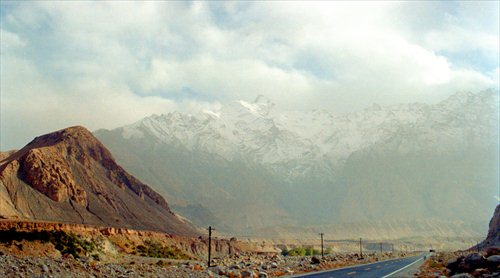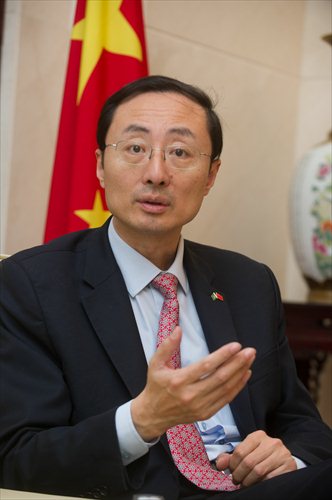HOME >> BUSINESS
A corridor to future development
Source:Global Times Published: 2015-8-5 19:23:01
Chinese Ambassador to Pakistan talks up promising potential of CPEC

A section of the Karakoram Highway in Northwest China's Xinjiang Uyghur Autonomous Region. Photo: IC

Chinese Ambassador to Pakistan Sun Weidong. Photo: Li Hao/GT
Editor's Note:
Chinese Ambassador to Pakistan Sun Weidong (Sun) spoke with Global Times reporter Chu Daye (GT) in a recent exclusive interview about the China-Pakistan Economic Corridor (CPEC), the flagship project of China's "One Belt and One Road" (OBOR) initiative, which aims to improve infrastructure connectivity of neighboring countries and regions. The following is an excerpt of the interview.
GT: CPEC is regarded by the media as the flagship project of the OBOR initiative. What do you think is the key element in ensuring the success of CPEC?
Sun: CPEC is a major and pioneering project of the OBOR initiative proposed by President Xi Jinping. After Premier Li Keqiang's visit to Pakistan in May 2013, the two governments set up the Joint Cooperation Committee (JCC), with working groups on different sectors to help promote cooperation.
So far, the JCC has held four meetings. Working groups such as energy, infrastructure, planning have held a number of meetings and field visits were also conducted. CPEC borders the Silk Road Economic Belt to the North, and connects to the 21st Century Maritime Silk Road in the South. China and Pakistan are all-weather strategic cooperative partners, and the government and people of Pakistan have expressed unanimous hope that the CPEC could play a key role in the development of Pakistan by invigorating its economy. The hope is in line with the principles of the OBOR initiative.
The Chinese Embassy in Pakistan hopes to seize this opportunity to push forward the building of the CPEC by working with relevant government organizations, serving as a bridge, providing policy guidance and protection to Chinese enterprises in Pakistan. We will do our best to create a favorable external environment for the CPEC.
President Xi's recent visit in April has achieved a lot concerning CPEC. Our job now is to implement and deliver. I believe the key in pushing forward the development of CPEC is a down-to-earth approach to see every project, proposal and agreement get fully implemented.
GT: How do you view the exemplary role of CPEC under the framework of the OBOR initiative?
Sun: The CPEC is an important part of the OBOR initiative. All of the basic concepts, thinking and policy of the OBOR initiative can be applied to the CPEC. The principles of mutual benefit, win-win, wide consultation, joint contribution and shared benefits and inclusive development, are all embedded in the CPEC.
CPEC not only benefits Pakistan and China but also boosts regional connectivity and common development and prosperity of the region. In the planning and building of CPEC, the two sides have been working closely. China's National Development and Reform Commission, Pakistan's Ministry of Planning, Development and Reform are playing a leading role in the JCC. China's Ministry of Foreign Affairs, Ministry of Commerce, Ministry of Transport and the National Energy Administration are also playing an active and significant part.
CPEC also scientifically combines the early harvest projects with medium to long-term planning. The two sides have set up a framework that includes the Gwadar Port, energy, infrastructure building and industrial cooperation as the four pillars in building the CPEC. From these aspects, CPEC could serve as a pilot project under the OBOR initiative. CPEC could also create favorable conditions for the OBOR initiative and strengthen the unparalleled partnerships between China and Pakistan.
GT: There have been discussions among Pakistanis over the routes of the CPEC. Do you think it will cause a divide among Pakistanis?
Sun: I don't think so. First, continuing to build a friendly China-Pakistan relationship is the consensus reached by all of the different political parties and all the people of Pakistan. President Xi, during his important speech at the Pakistani parliament in April, said the CPEC will benefit all of the provinces and the entire population of Pakistan. This fundamental goal has never changed. CPEC's early harvest projects spread across all of Pakistan's provinces, with no one left out.
Second, CPEC should not be understood as one road or one route. It should be seen as a long-term, comprehensive cooperation framework, which covers a wide range of different sectors. Roads, railroads, telecommunication routes, and people-to-people exchanges, can all be regarded as components of CPEC. The cooperation in these fields will bring prosperity and development. Third, after discussions and consultations, we see a nation-wide consensus in Pakistan on supporting CPEC. I believe that with the implementation of the projects of CPEC, our two brotherly peoples will benefit and get even closer.
GT: There are voices that the OBOR initiative is aimed at offloading China's overcapacity. What is your understanding of this?
Sun: CPEC includes industrial cooperation, which is in line with the common interest of the two sides. I think the two nations' economies complement each other considerably. China has a higher level of manufacturing, technical standards and management skills. Pakistan has a sizable young population and traditional ties with the Middle East and Europe.
To my knowledge, the Pakistani government and entrepreneurs welcome industrial cooperation with China. For example, in the textile industry, China has advantages in design and apparel processing, while Pakistan has a good industrial foundation, such as abundant raw material, effective management and an ample labor force, so Pakistani friends are willing to cooperate with us. Moreover, the cooperation in future will go beyond the textile industry.
GT: Are the Chinese companies in Pakistan from the State-owned sector or the private sector? What do you want to say to the Chinese entrepreneurs planning to establish businesses in Pakistan?
Sun: Many of CPEC's key projects are currently carried out by State-owned companies from China. But there are also many companies from the private sector that have showed interest in doing business in Pakistan. The Chinese government encourages companies with strong performance and good credit to invest in Pakistan. I think several aspects should be noted.
First, CPEC projects should be based on the principles of win-win.
Second, CPEC should be built with scientific planning and a step-by-step approach. The companies should start their businesses after due research and study of the national situation and the business environment of Pakistan.
Third, with years of experience in the overseas markets, the relocated production capacity at this stage should be of high quality. And the business should integrate construction with services and trade, as well as bringing jobs and vocational training to the local community and pay attention to environment issues.
Fourth, the government of Pakistan is undertaking more effective measures to ensure the safety of the Chinese personnel working in Pakistan. We highly appreciate these efforts and hope they could help create a safe and sound environment for the future building of the CPEC.
Posted in: Insight